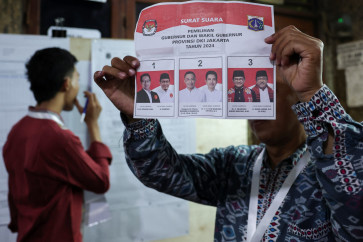Popular Reads
Top Results
Can't find what you're looking for?
View all search resultsPopular Reads
Top Results
Can't find what you're looking for?
View all search resultsCepu delay losses to RI could be up to $150m
Production delays in the huge Cepu oil and gas block may have caused up to US$150 million in potential state revenue losses, upstream oil and gas regulator BPMigas told lawmakers Thursday
Change text size
Gift Premium Articles
to Anyone
P
roduction delays in the huge Cepu oil and gas block may have caused up to US$150 million in potential state revenue losses, upstream oil and gas regulator BPMigas told lawmakers Thursday.
The figure for potential losses in state revenues is calculated based on the government's share of the initial production target of 20,000 barrel oil per day (bopd), given the assumption of a crude oil price at US$60 per barrel, BPMigas's chairman R. Priyono said in a hearing with the House of Representatives Commission VII overseeing energy and mineral resources.
"The Cepu block was targeted to produce 20,000 bopd of oil from January onward, but as of today the block only produces between 1,000 and 5,000 bopd of oil," Priyono said.
The Cepu block, discovered in March 2001, is located at the border of East Java and Central Java, and is said to have estimated proven reserves of 600 million barrels of oil and 1.7 trillion cubic feet of gas.
Mobil Cepu Ltd, a local subsidiary of US energy giant ExxonMobil, and state oil and gas company PT Pertamina each hold 45 percent participating interest in the block, while the remaining 10 percent of the stake is owned by a consortium of enterprises owned by provincial administrations (BUMD).
The 20-hectare land block is supposed to reach its planned full production capacity by 2012 but attainment of production targets is seriously delayed.
But Priyono pointed to problems with land acquisition as being the main contributing factor causing delay, as the regent of Tuban, the administrative area of the Cepu block, has yet to produce the license required in order to acquire the land.
"We have asked for *the land acquisition permit* so many times, but the Tuban regent has been very non cooperative.
"We hope the Commission VII could summon the regent, because the Cepu block development is very important for our nation," Priyono said.
Priyono said that part of the land acquisition problem also related to the area required for the installation of a ten kilometer length of pipeline.
A total of 37 kilometers of pipeline was needed to channel the oil from the block's central processing unit to an offshore floating storage facility.
He added that the delay in the development of the block and in subsequent oil production would mean the regional government would not yet receive revenue from the project.
"We will suffer bigger losses in potential revenue if the land acquisition problem is not settled," he said.
Priyono said that with the current situation, the 20,000 bopd production traget was expected to be reached by August at the earliest.
Responding to the BPMigas report, head of Commission VII Airlangga Hartarto said the commission would establish a special team to investigate the production delay.
"The Cepu block is very important for our state budget. Therefore, the team will investigate what the real problems are," Airlangga said.
The Cepu block gives high hopes for Indonesian oil production with the industry struggling to pump more oil from its aging oil fields.
At its peak, the block is expected to produce 165,000 barrels of oil per day-or some 15 percent of the total national production.










